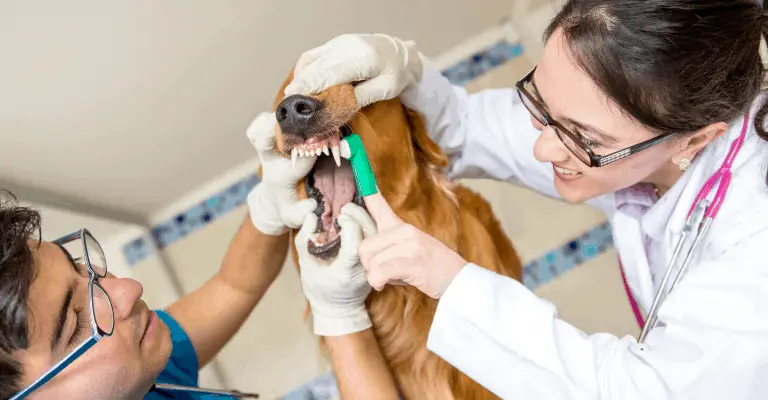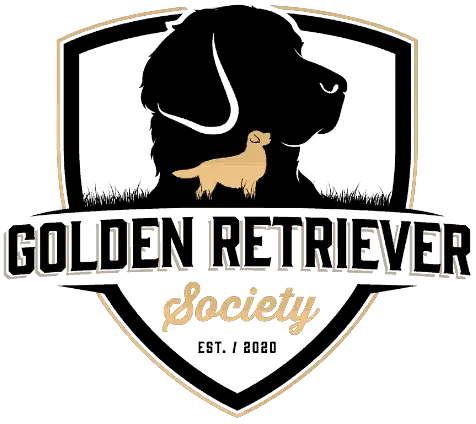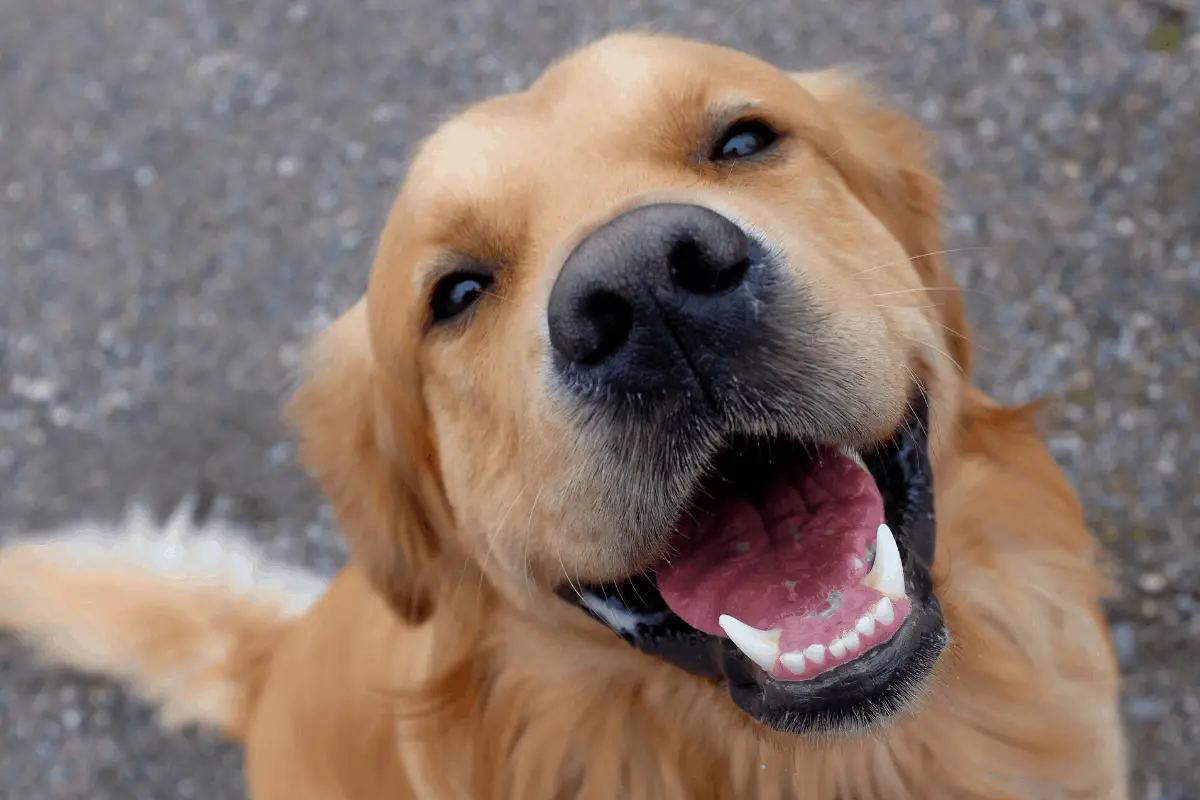One of the most common health conditions affecting our dogs, including Golden Retrievers, is dental disease. Just like us, dogs need to have their teeth cleaned regularly to keep them healthy and prevent painful conditions from developing.
Thankfully, Golden Retrievers don’t usually have too many teeth problems, but they can still develop dental disease as they age. The good news is there are steps you can take to help slow down the process.
Table of Contents
Brushing
The number one best thing you can do to protect your Golden Retriever’s teeth is to brush them on a daily basis.
Brushing their teeth helps to remove food particles and plaque, preventing the formation of tartar and calculus.
If tartar is allowed to build up on the surface of their teeth over time, it can lead to infection and inflammation underneath the gums and around the roots of the teeth. This can cause their teeth to become loose, their mouths to become painful, and tooth root abscesses to develop.
By brushing your dog’s teeth, you drastically help to keep their mouth healthy and prevent these things from happening. It’s best to start getting them used to having their teeth brushed when they are puppies, as this is the best time for learning.
You can use “dog safe” toothpaste that does not contain sugar-free flavorings, such as Xylitol, which is toxic to dogs.
Finger Brush

Finger brushes can make it easier to brush their teeth, as you just slip the finger brush on over your finger, and then you can rub your index finger back and forth along the surface of their teeth.
Brushing daily is ideal, but even a few times a week is beneficial.
Dental Chews
Every dog is different and some just will not allow you to brush their teeth no matter how enticing you try to make it. If brushing isn’t a viable option, approved dental chews and treats, are the next best thing.
The Veterinary Oral Health Council (VOHC) has a list of approved products on their website for dogs.
For dental chews to work appropriately, your dog needs to actively gnaw and chew on them. It’s not sufficient for them to just break them in half or bite them into pieces and then swallow. Some dogs just want to break and swallow them, but it works best if they really sit there and chew on them.
It’s important to make sure you look for the “VOHC” seal of approval on any item marketed for dental health in dogs, as there are many products out there, but not all of them have been proven to be effective in doing what they claim to do.
Virbac C.E.T. Enzymatic Oral Hygiene Chews are highly recommended and a great option to help care for your Golden Retriever’s teeth.
Dental Wipes
Dental wipes are another option, though this is similar to brushing in that you do have to put your fingers in your dog’s mouth. Dental wipes are exactly what they sound like. You use them to wipe along the outer and inner surfaces of your dog’s teeth, ideally on a daily basis.
It’s best to get the ones with antibacterial properties, such as ones with chlorhexidine imbedded in them. Again, refer to the Veterinary Oral Health Council’s website or make sure their seal of approval is on the packaging.
Water Additives
Another option is what we would consider “mouth wash” for dogs. Although, it isn’t exactly mouth wash, as it is definitely safe to swallow.
Water additives are supplements you can add into your dog’s water bowl that helps their breath smell better. They are essentially an oral solution that contains enzymes that can break away plaque from your dog’s teeth, inhibiting bacterial growth.
All you have to do is read the label and add the appropriate amount of the solution to the appropriate amount of water.
One of the only drawbacks is that some dogs do taste a difference in their water when it is added and then either drink less or may refuse to drink from that bowl. If this happens, it’s best to not force them to drink it and just try one of the other teeth care options.
Prescription Dental Care Dog Food

There is prescription food available that can help break off plaque and tartar from your dog’s teeth. The way the kibble is sized and formulated is very specific to serve this purpose.
This is a good option for dogs that don’t like to chew their food and instead swallow smaller kibbles whole. For dogs with chronic teeth issues, this may be the only viable option, though the food may be more expensive than your typical dry dog food.
Veterinarian Dental Cleanings
Some dogs just need regular dental cleanings with their veterinarian. Typically, Golden Retrievers just need professional dental cleanings once or twice in their lifetime, as they aren’t predisposed to severe dental disease like smaller breeds of dogs.
However, if your Golden breaks or chips a tooth, this could be another reason for needing a professional dental visit, as broken teeth usually need to be removed or they can become a source of infection and pain.
Having their veterinarian do a professional dental cleaning or tooth removal does involve them going under anesthesia because it is not safe or humane to do a thorough dental cleaning on an awake dog.
Prior to anesthesia, your veterinarian will check bloodwork on your dog and do a thorough exam to make sure they are healthy enough for such a procedure. They will also be monitored closely during the dental visit and if anything seems off, your veterinarian will wake them up right away.
How do I know if my dog is having trouble with his teeth?
You may not even know if your dog has pain in their mouth. They are very good at hiding it and may only show very subtle signs, if any at all. Here are some signs that your dog may be having a dental problem:
- dropping food when eating
- excessive salivation/drooling when eating & at other times
- pawing at the mouth/jaw
- chattering their jaw
- swallowing food whole (if this is not their normal way of eating)
- weight loss
- acting like they want to eat, but then turning away
- having a foul odor coming from their mouth
Conclusion
Oral health for dogs is extremely important. Just as with humans, taking care of teeth is much easier than dealing with the negative effects of dental neglect.
If you are interested in some of the dog treat options that we recommend, be sure to visit our article Best Dog Treats For Golden Retrievers. While a healthy diet and quality dental treat can really help with oral care, be sure to incorportate as many of the other options we have listed here as well.
If you feel your dog is having trouble eating or in need of a dental cleaning, contact your veterinarian so they can evaluate your dog and help guide you in what may be the best option for them.

